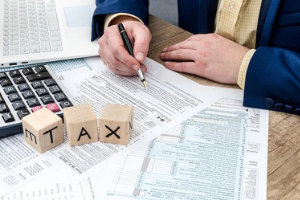VAT SERVICES
IN DUBAI, ABU
DHABI & THE UAE
Our VAT service in Dubai, Abu Dhabi, and the UAE is part of our tax consultancy services in Dubai, Abu Dhabi and the UAE.
Value Added Tax (VAT) is an indirect tax on the consumption or use of goods or services; it is applied across the stages of the supply chain, from when the manufacturer purchases raw materials until the retailer sells the goods to the consumer. Registrants for VAT will collect the VAT applicable to their taxable activities from their customers and pay the tax collected to the authorities. Download the free UAE VAT invoice template.
Any natural and legal person who carries on economic activity is subject to VAT and is required to register for VAT.
HOW IS VAT CALCULATED?
A retrospective test calculates the total value of supplies made by the taxable person at the end of a month inclusive of the previous 11 months.
While a prospective test calculates the total value of supplies expected to be made by the taxable person within the next 12 months.
However, it is the notion in the KSA, for example, that most taxpayers are expected to register on the basis of the retrospective test. Accordingly, the taxable person must apply to the authority within 30 days of the end of that month; and the registration will be effective from the start of the next month following the month in which the application is submitted.
CRITERIA FOR VAT REGISTRATION IN THE UAE
It is mandatory for all resident persons in the UAE to register for VAT if their annual taxable supplies and imports over a 12-month period exceed AED 375,000. It is also optional for resident persons whose supplies and imports exceed AED 187,500 per year. Foreign businesses also can file to recover the VAT they incur when visiting the UAE.
WHAT IS THE VAT RATE IN THE UAE?
VAT was introduced in the UAE on 1 January 2018; the VAT rate is 5%.
REGISTRATION FOR VAT
Taxable Persons are required to register for VAT through the platform of the Federal Tax Authority (“FTA”).
The taxable person needs to issue a tax invoice within 14 days from the date of supply in the UAE currency.
At the end of the tax period, the taxable person needs to file a VAT return electronically.
A VAT return is filed each month for taxable persons with annual revenues of AED 150 million or more; or quarterly for taxable persons with revenues below AED 150 million.
VAT registered businesses are regularly required to report the amount they charged for VAT and the amount they paid to the FTA; if the amount they charged is higher than the paid amount, then they must pay the difference to the authority. On the contrary, if the VAT amount they charged is lower than paid amount, then the VAT registered businesses can reclaim the difference from the FTA.
DOES VAT APPLY TO ALL BUSINESSES ACROSS THE UAE?
Yes, VAT is equally applied on all businesses registered in the mainland and free zone jurisdictions. Yet, the UAE Cabinet defines certain free zone as a ‘designated zone’ thus treated as being outside the State. Goods transferred across businesses within the designated zones are free of tax. There are 27 designated zones across the UAE.
List of Supplies on which 0% VAT is charged:
- Supply and import of medication and medical equipment registered with the Ministry of Health and Prevention under its permission or approval.
- Supplies made by government entities are excluded from VAT if the entity is the sole provider of the supply and has no competition within the private sector.
- Direct or Indirect exports of goods and services outside the GCC territory.
- International transportation of passengers and goods that start, end or pass through the territory of the state.
- Supply of goods and services related to the transfer of goods and passengers abroad via land, air or sea.
- Air passenger transport if it is international carriage.
- Supply of certain means of sea, air and land transportation for the purpose of passenger and goods transportation.
- Supply of aircrafts and vessels for rescue purposes by air or sea.
- Supply of certain healthcare services, and related goods and services.
- Supply of certain education services and related goods and services.
- Supply or import of investment precious metals (e.g. gold and silver of 99% purity).
- Supply of buildings to be used by charities.
- Supply of buildings converted from non-residential to residential.
- Supply of residential buildings within 3 years of its completion.
- Supply of crude oil and natural gas.
VAT-EXEMPT SECTORS
- Some financial services.
- Residential properties.
- Bare Land.
- Local passenger transport.
TAX GROUP
A Group of companies can register for VAT as a Tax Group. The following are the requisites to form a Tax Group:
- Each Legal Person must have a place of establishment in the State.
- The Legal Persons must be related parties.
- One or more of the Legal Persons should have ownership and control of the others.
HOW DO I REGISTER FOR VAT RETURNS FILING IN THE UAE?
Creation Business Consultants understands complying with VAT regulations can feel overwhelming. Here is a simplified guide to registering for VAT return filing in the UAE:
VAT REGISTRATION METHOD
- Voluntary registration:
If the taxable person turnover for the last 12 months is more than AED 187,500 - Mandatory registration:
If the taxable person crossed the mandatory threshold (AED 375,000) then there is a must to submit a registration application within 30 working days after crossing the threshold to avoid a penalty with amount of AED 10,000 that will be charged from FTA.
VAT REGISTRATION PROCESS
- Contact Creation Business Consultant for your VAT consultation
- We complete a review of your business
- Access the Federal Tax Authority (FTA) E-MARATAX Portal
- Create and register for a new account
- Complete the application: Provide necessary business information, financial statements, and supporting documents.
- Submit Application and Await Approval: The FTA will review your application.
- Outcome: Once the FTA has responded we will notify you of the outcome that your business is successfully registered.
STEPS ONCE APPROVED
- We will share with you the Tax Certificate along with the Registration Number (TRN) which is crucial for VAT purposes.
- Thereafter your company will be required to file VAT returns based on the tax period (monthly or quarterly).
WHAT ARE THE PENALTIES FOR LATE OR INCORRECT VAT RETURNS FILING?
Creation Business Consultants understands the importance of VAT compliance for businesses in the UAE. Filing inaccurate or late VAT returns can lead to hefty penalties from the Federal Tax Authority (FTA). Here’s a breakdown of what you need to know:
LATE VAT RETURN FILING
- First time: A penalty of AED 1,000 will be imposed.
- In case of repetition (within 24 months): The penalty increases to AED 2,000.
INCORRECT VAT RETURN FILING
- First time: A penalty of AED 1,000 will be imposed.
- In case of repetition (within 24 months): The penalty increases to AED 2,000.
VOLUNTARY DISCLOSURE
- 5% on the difference, where the Voluntary Disclosure is submitted within one year from the due date of submission of the Tax Return, the Tax Assessment, or the relevant refund application.
- 10% on the difference, where the Voluntary Disclosure is submitted within the second year following the due date of submission of the Tax Return, the Tax Assessment, or the relevant refund application.
- 20% on the difference, where the Voluntary Disclosure is submitted within the third year following the due date of submission of the Tax Return, the Tax Assessment, or the relevant refund application.
- 30% on the difference, where the Voluntary Disclosure is submitted within the fourth year from the due date of submission of the Tax Return, the Tax Assessment, or the relevant refund application.
- 40% on the difference, where the Voluntary Disclosure is submitted after the fourth year from the due date of submission of the Tax Return, the Tax Assessment, or the relevant refund application.
ADDITIONAL PENALTIES
- Unpaid VAT: 2% of the unpaid Tax shall be due on the day following the due date of payment, where the settlement of Payable Tax is late., followed by 4% monthly penalty is due after one month from the due date of payment, and on the same date monthly thereafter, on the unsettled Tax amount to date. (capped at 300% of the tax amount).
- Voluntary Disclosure: Penalties can be significantly higher if errors are discovered during an audit rather than being voluntarily disclosed beforehand.
Please note: This information is intended for general awareness and should not be considered as tax advice. It’s always best to consult with a qualified tax professional for personalized guidance on your specific situation.
ARE THERE ANY SPECIFIC REQUIREMENTS FOR VAT RETURNS FILING FOR CERTAIN INDUSTRIES OR SECTORS IN THE UAE?
While the core VAT return filing process remains consistent across most industries in the UAE, there can be some specific requirements for certain sectors. We have given a brief below to include:
GENERAL VS. SPECIFIC REQUIREMENTS:
- General Requirements: All businesses follow the standard filing process outlined previously, including registration thresholds, deadlines, and core information submitted.
- Specific Requirements: Certain industries may have additional reporting requirements mandated by the Federal Tax Authority (FTA). These can include:
- Detailed record-keeping: Sectors like real estate or financial services might need to maintain more detailed records for specific transactions.
- Specialized calculations: Industries with zero-rated or exempt supplies (e.g., education, healthcare) may have unique VAT calculations to report.
- Sector-specific forms: Some sectors might require additional forms or schedules attached to their regular VAT returns.
RECOMMENDATION FOR INDUSTRY-SPECIFIC VAT FILING
For industry-specific VAT filing requirements, it is crucial to consult with our tax experts. We can provide the latest guidance and ensure your business adheres to all relevant regulations.
Even with general VAT compliance, our team can assist you with:
- Understanding potential industry-specific requirements.
- Gathering and organizing necessary documents.
- Filing your VAT returns accurately and on time.
HOW IS VAT ASSESSMENT CONDUCTED IN THE UAE?
VAT in the UAE operates under a self-assessment system. This means businesses are responsible for calculating the VAT they owe and filing accurate VAT returns with the Federal Tax Authority (FTA). However, the FTA can still conduct audits/Assessment to verify the information you have provided. Here is a breakdown of VAT assessments in the UAE:
SELF-ASSESSMENT PROCESS
- Calculating VAT Liability: Businesses calculate the VAT they owe by subtracting recoverable input tax (VAT paid on business purchases) from output tax (VAT charged on sales).
- Filing VAT Returns: VAT returns are submitted electronically via the FTA, detailing your VAT calculations and relevant transactions.
- Payment of VAT: The calculated net VAT amount must be paid to the FTA by the designated deadline to avoid penalties.
FTA VAT ASSESSMENT
- Audit Selection: The FTA can choose any business for an audit at any time, with or without prior warning. Factors like business size, complexity, and past compliance history can influence selection.
- Audit Process: During an audit, the FTA will review your VAT returns, accounting records, and supporting documents to ensure accuracy.
- Assessment Outcome:
- Correct Filing: If everything is in order, no further action is taken.
- Discrepancies Found: In case of errors, the FTA may issue a VAT assessment. This will detail any underpayment of VAT or overclaimed input tax deductions.
- Penalties and Interest: The assessment will likely include penalties and interest charges on any outstanding tax amount.
HOW CREATION BUSINESS CONSULTANTS CAN ASSIST WITH VAT
- We can help you understand your VAT obligations and ensure accurate calculations.
- Making sure that all of the reports and invoices templates are compliance with the laws and regulations
- Determine the sale types based on the business activity (Standard sales, Zero Rated sales and Exempted Sales)
- We can assist with record-keeping practices to facilitate potential audits.
- We can guide you through the voluntary disclosure process if needed.
WHAT ARE THE COMMON REASONS FOR VAT ASSESSMENT DISPUTES?
Despite the self-assessment system for VAT in the UAE, differences may arise between businesses and the Federal Tax Authority (FTA) during the assessment process. Here are some common reasons for VAT assessment disputes:
- Errors in VAT Calculations
- Miscalculations of Output Tax: Businesses may unintentionally overestimate or underestimate the VAT charged on their sales.
- Input Tax Deduction Errors: Incorrectly claiming input tax on non-business expenses or purchases not used for taxable supplies can lead to disputes.
- Record-Keeping Issues:
- Incomplete or Inaccurate Records: The inability to provide detailed records to support VAT calculations during an audit can raise doubts from the FTA.
- Missing Supporting Documents: Absence of invoices, receipts, or contracts for transactions can complicate verification of VAT treatment.
- Classification of Supplies:
- Zero-Rated vs. Exempt vs. Standard Supplies: Businesses may incorrectly categorize their supplies, leading to disagreements on the applicable VAT rate (0%, exempt, or 5%).
- Mixed Supplies: Difficulties arise when a single supply includes elements taxed at different rates, requiring proper apportionment of VAT.
- Interpretation of VAT Regulations:
- Complex Transactions: Unclear VAT treatment for specific transactions, especially in new or niche industries, can lead to disputes.
- Changes in Regulations: Businesses may struggle to keep up with updates to VAT rules and unintentionally misinterpret their obligations.
- Voluntary Disclosure Issues:
- Incomplete Disclosure: If a voluntary disclosure of errors is incomplete or lacks supporting evidence, the FTA might not grant full leniency on penalties.
- Disclosure Timing: Disclosing errors too close to a potential audit by the FTA may raise questions about the intent behind the disclosure.
HOW CAN I APPEAL A VAT ASSESSMENT DECISION?
If you to disagree with a VAT assessment decision from the Federal Tax Authority (FTA), you have options to appeal. Here’s a breakdown of the process:
TWO-TIERED APPEAL SYSTEM
The UAE offers a two-tiered system for appealing VAT assessment decisions:
- Reconsideration Request: This is the first step. You can submit a request for reconsideration directly to the FTA within 20 business days of receiving the assessment notification. The request should clearly state the reasons for your disagreement and be supported by relevant documents and evidence.
- Tax Disputes Resolution Committee (TDRC): If the FTA’s reconsideration decision is still unsatisfactory, you can escalate the appeal to the TDRC within 20 business days of receiving their response. The TDRC is an independent body that reviews disputes between taxpayers and the FTA. Filing with the TDRC typically requires legal representation and may involve fees.
IMPORTANT CONSIDERATIONS
- Time Limits: Adhering to strict deadlines for submitting reconsideration requests and appeals to the TDRC is crucial. Missing deadlines can weaken your case.
- Arabic Language Requirement: Both the reconsideration request and any supporting documents submitted to the FTA must be in Arabic.
- Legal Representation: While not mandatory for reconsideration requests, seeking professional guidance from a qualified tax advisor such as Creation Business Consultants is highly recommended, especially for complex cases or appeals to the TDRC.
WHAT ARE THE RISKS RELATED TO VAT SERVICES IN THE UAE?
Through careful planning and professional advice, the minimal risks connected to Taxes in the UAE can be reduced. You can handle the Tax legislations and procedures easily with the assistance of professional consultants, ensuring adherence to legislations and reducing potential risks.
For an expert consultation, contact Creation Business Consultants via email [email protected] or call +971 4 878 6240 today.
VAT IN OTHER GCC COUNTRIES
- Oman
VAT was introduced on 16th April 2021 and the standard VAT rate is 5%.
- Bahrain
A 10% VAT rate applies in Bahrain with effect from 1st January 2022.
- Kuwait
Due to inflation and oil price hikes, Kuwait has second thoughts on introducing a VAT at a rate of 5% in 2023; instead, it is exploring the possibility of imposing an excise or turnover tax on a limited range of supplies.
- Qatar
There is no VAT imposed in Qatar yet; however, it is expected to be effective during 2023 at a 5% rate.
UAE VAT FAQs
Voluntary registration is available for businesses with taxable supplies and imports exceeding AED 187,500 annually. This allows businesses to recover VAT on supplies but requires them to charge VAT on taxable transactions.
Zero-rated supplies are goods and services taxed at 0%, allowing businesses to reclaim VAT on related expenses. Examples include international transport, certain healthcare and educational services, and exports outside the GCC.
Exempt supplies include financial services, residential real estate, bare land, and local passenger transport. These transactions do not incur VAT and businesses cannot reclaim VAT on related costs.
Penalties for non-compliance include fines for late registration, late filing, incorrect reporting, and failure to maintain proper records. Ensure timely and accurate compliance to avoid these penalties.
Maintain detailed records of all transactions, including invoices, receipts, and import/export documents. Records must be kept for at least 5 years to comply with UAE VAT regulations.
Yes, businesses can claim VAT refunds on certain expenses related to business activities. The process involves meeting specific criteria and filing a refund application with the Federal Tax Authority (FTA).
VAT invoices must include details such as the VAT registration number, VAT rate applied, and total VAT amount. Accurate invoicing is essential for compliance and VAT recovery.
VAT adds 5% to the cost of taxable goods and services. Businesses need to consider VAT when setting prices and communicating costs to customers to ensure transparency and compliance.
Correct errors by submitting an amended VAT return as soon as possible. Contact [email protected] for assistance with correcting any mistakes.
VAT on imports must be paid upon entry of goods into the UAE. Ensure proper documentation and payment to comply with import VAT regulations.
Deregistration is required if taxable supplies fall below AED 187,500. Submit a deregistration request to the FTA and ensure all VAT returns and payments are up to date.
Prepare for a VAT audit by ensuring all records are accurate and organized. Review your VAT compliance processes and consult with our experts for audit preparation assistance.
Yes, VAT on business travel expenses can be reclaimed if the travel is related to business activities. Ensure proper documentation and adherence to FTA guidelines.
Non-resident businesses may claim VAT refunds on certain expenses incurred in the UAE. The process involves specific criteria and a refund application with the FTA.
For personalized assistance with VAT compliance, including registration, filing, and audits, contact Creation Business Consultants at [email protected]. Our experts are ready to help.
Stay informed about VAT updates by following news from the FTA and consulting with our experts. We provide regular updates and guidance on VAT changes. Reach out to us at [email protected] for the latest information.
Required documents include your trade license, passport copies of shareholders, Emirates ID copies of shareholders, financial statements, bank account details, and proof of business address. Ensure all documents are clear and valid to avoid delays.
Businesses with taxable supplies and imports exceeding AED 375,000 annually must register for VAT. Businesses anticipating exceeding this threshold within the next 30 days are also required to register.
Businesses with branches across multiple Emirates or related parties can apply for VAT group registration. This allows for a single VAT registration and consolidated VAT reporting for the entire group.
Failure to register for VAT can result in financial penalties, legal liabilities, and reputational damage. Non-compliance may lead to fines for late registration and other VAT-related offenses.
Engaging a VAT consultant or legal firm ensures that you navigate VAT regulations effectively, stay compliant, and avoid potential penalties. Professionals can provide tailored advice and support to manage VAT obligations efficiently.
Creation Business Consultants offers comprehensive VAT registration services, including application preparation, document submission, and compliance advice. Contact us at [email protected] for support with your VAT registration.
















